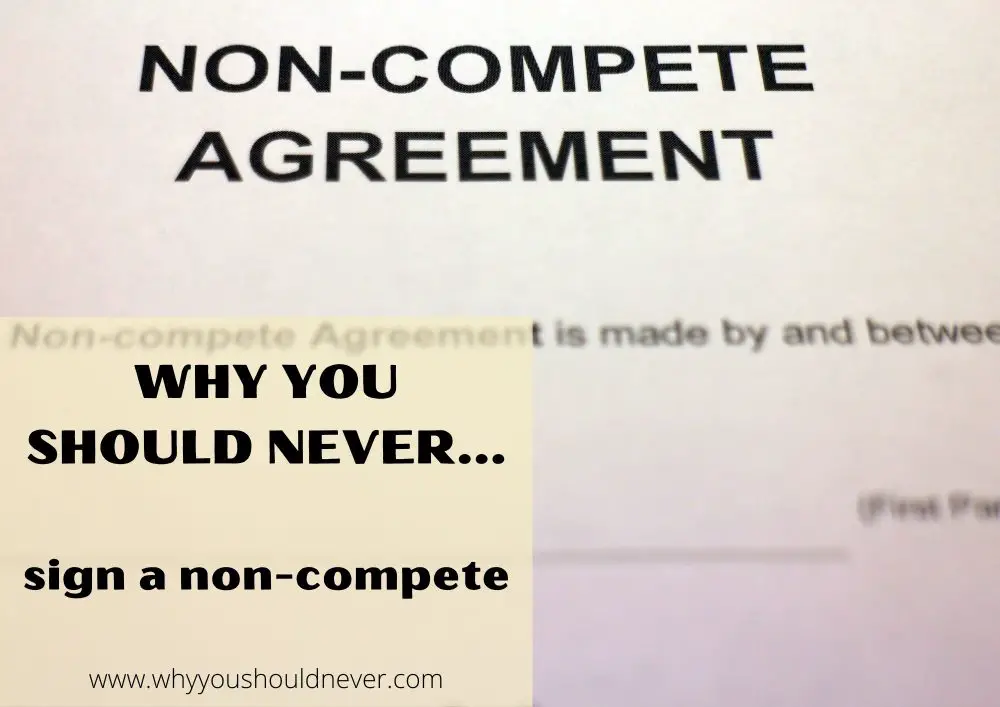![]()
Why You Should Never Sign A Non-compete
A non-compete agreement is a contract between an employer and an employee in which the employee agrees not to compete with the employer for a period after the employment relationship has ended.
Non-competes are often included as part of an employment contract, but they can also be signed after the fact. They’re typically used to protect an employer’s trade secrets or other proprietary information.
Non-compete agreements can also be signed by people who sell their businesses. In these cases, the agreements are designed to protect the buyer’s investment by preventing the seller from starting a competing business.
While non-competes can be beneficial to employers and those who acquire businesses, they can also be detrimental to employees or sellers. In this article, we’ll take a look at some of the reasons why.
7 reasons why you shouldn’t sign a non-compete agreement
1. Non-competes can restrict your ability to find employment
If you’re subject to a non-compete, it can limit your job prospects if you ever decide to leave your current company. That’s because you may not be able to work for a competitor of your current employer, as that might be a violation of the agreement.
This can make it difficult to find new employment, especially in industries, such as tech, where non-competes are common.
2. Non-competes can reduce your earning potential
If you’re subject to a non-compete, it can limit your ability to negotiate higher wages at your current company.
This is because if you leave, you might not be allowed to work for any competitors, thereby limiting your options and, as a result, your ability to command a higher salary from your current employer who knows you can’t go anywhere else.
3. Non-competes can hinder your ability to start your own business
Being subject to a non-compete often prevents you from starting your own business in the same industry as your current employer.
The main issue here is that you’re probably an expert in the industry you work in and starting your own business in that same industry would be the best way to utilize your skills and experience. However, if you’re under a non-compete, you may not be able to do this.
4. Non-competes can stifle creativity and innovation
Knowing that you’re unable to compete in a particular industry or field will more than likely hinder your ability to be creative and innovative in your job.
You’ll constantly be fearful of coming up with new ideas or processes that could be seen as a violation of your non-compete, which will stifle your creativity. This can prevent breakthroughs and innovations that could benefit both yourself and your company.
5. Non-competes can damage employer-employee relations
The agreements often create an atmosphere of mistrust, as the employee may feel like they’re being monitored and restricted. This can lead to tension and conflict between the two parties, which can damage morale and productivity.
6. They’re sometimes used unethically
Unfortunately, some unscrupulous employers will require employees to sign non-competes without fully disclosing the terms of the agreement.
Or, they’ll try to enforce non-competes that are overly restrictive or unfair, thereby forcing the employee to stay with the company longer than they want to.
7. Non-competes can lead to legal battles
The sad reality is that non-competes often lead to lengthy and brutal legal battles. Companies don’t want competition from their former employees and will often sue them if they believe that they’re in violation of their agreement.
Employees can, of course, challenge the validity of the non-compete in court if they feel it’s unfair or too restricting, but these legal battles can be costly and time-consuming for both parties involved.
Conclusion
It’s not always possible to avoid signing a non-compete agreement, but it’s important to be aware of the potential drawbacks before doing so. This usually involves thinking ahead to the future and considering what you want to do next in your career.
If you’re planning on leaving your current company or starting your own business, then a non-compete agreement might not be right for you, especially if you have a skill in a specialized area or industry.
It’s always best to consult with an attorney before signing any legal document, especially a non-compete agreement. They can help you understand the implications of signing such an agreement and advise you on whether or not it’s in your best interest to do so.
